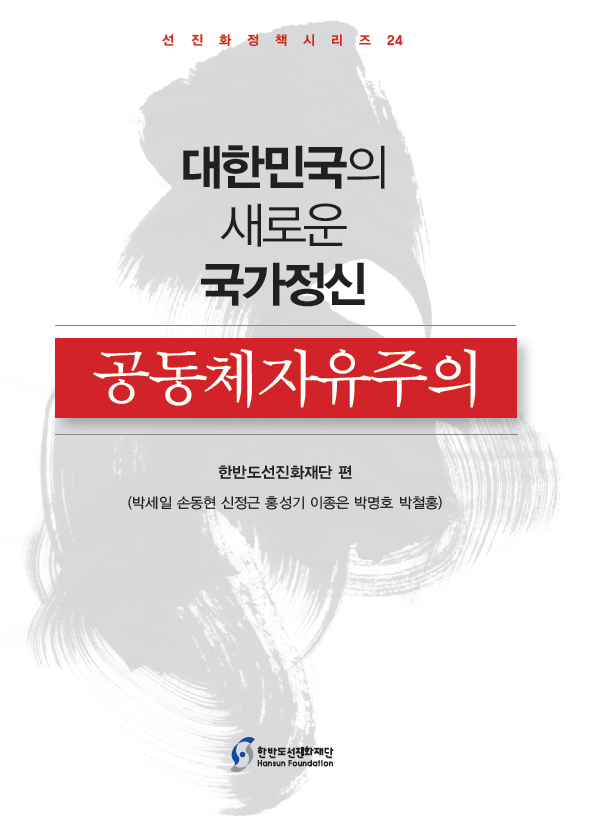A New National Ideology for Korea: Communitarian Liberalism
- Author : Hansun Foundation
- Publisher : 2015
- Price : 18,000Won
- ISBN-10 :
- ISBN-13 : 978-89-93093-17-9
South Korea’s current state of affairs requires a new national ideology. A national ideology is the principle that unites and guides a country’s citizens. The ideology needed in Korean society today is communitarian liberalism, a type of liberalism that respects and values the idea of a community. South Korea currently faces three challenges: 1) finding a new < national happiness principle >, 2) proposing a new < state reconstruction ideology >, and 3) establishing a < reunification ideology >. The answer to these challenges is found in communitarian liberalism.
This book is Hansun Foundation’s second publication on communitarian liberalism. The book not only discusses the compatibility but also the synergy of communitarianism and liberalism. Contributors include Hansun Foundation’s founder and honorary president Se-Il Park, Sunkyunkwan University honorary professor Dong-Hyun Son, Sunkyunkwan University professor Jung-Geun Shin, Ajou University professor Sung-Ki Park, Kookmin University professor Jong-Eun Lee, Hankuk University of Foreign Studies professor Myung-Ho Park, and Yeungnam University professor Chul-Hong Park. We hope that the influence of the communitarian liberalism ideology proposed in this book extends beyond the borders of Korea.
Part 1/ What is Communitarian Liberalism? _ Se-Il Park
1. The Needs of an Era: A New Ideology
2. What is Communitarian Liberalism?
3. Communitarian Liberalism for Principles of National Happiness
4. Communitarian Liberalism’s Interpretation of Humanity
5. Communitarian Liberalism for State Reconstruction
6. Communitarian Liberalism for Reunification
7. Communitarian Liberalism for Government Reform
Part 2/ Philosophical Foundations of Communitarian Liberalism – Dong-Hyun Song
1. Social Philosophy’s Fundamental Conflict: Opposition between the Individual and Society
2. Individual Identity and Social Identity
3. Individualism – Liberalism
4. Communitarianism – Egalitarianism
5. Synthesis of Communitarian Liberalism
Part 3/ Communitarian Liberalism and Foundations of Eastern Philosophy – Jung-Geun Shin
1. Introduction
2. Eastern Philosophy and the Assets of Communitarian Liberalism
3. Practical Application of the Assets of Communitarian Liberalism
4. Conclusion
Part 4/ Communitarian Liberalism and Philosophical Anthropology – Sung-Ki Hong
1. Human’s Existential Situation
2. Dual Understanding of the self in Eastern history
3. Communicable Thoughts of Liberalism
4. Infrastructure for the realization of communitarian liberalism
Part 5/ Political Beginnings of Communitarian Liberalism – Jong-Eun Lee
1. Introduction
2. Opposition between Liberalism and Communitarianism
3. Possibility of a Liberal Community
4. Implications Communitarian Liberalist Policies
5. Conclusion
Part 6/ Economic Perspective of Communitarian Liberalism – Myung-Ho Park
1. Introduction
2. Before Modern Economic Thought
3. Economic Thought of Mercantilism
4. Birth of Modern Economics
5. Communitarian Liberalism as a Solution to Current Economic Challenges
Part 7/ Communitarian Liberalism and the Foundations of Education
1. Introduction
2. Opposition between Individual and Society and the Problem with Korean Education
3. Life and Education in Communitarian Liberalism
4. Conclusion
Annex
1. 2005, 21st Century National Advancement Ideology: Communitarian Liberalism – Se-Il Park
2. 2014, Why Communitarian Liberalism? – Se-Il Park
3. A Historical Outline of Communitarian Liberalism – Se-Il Park
